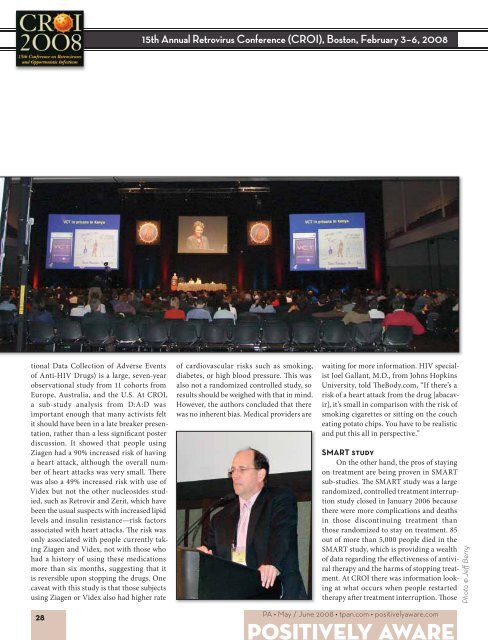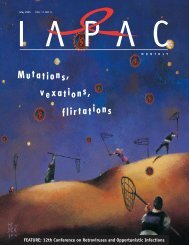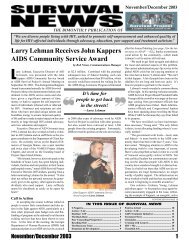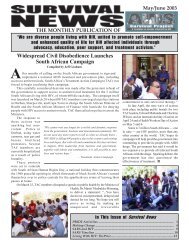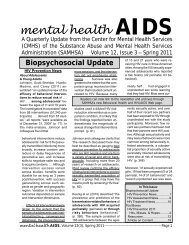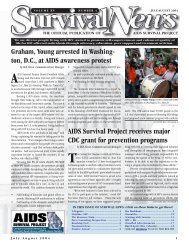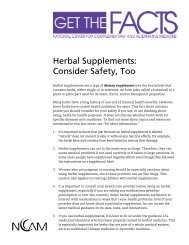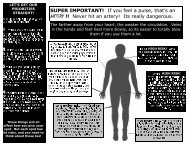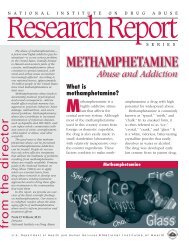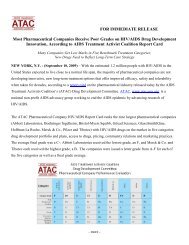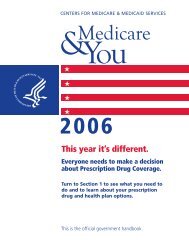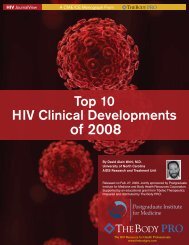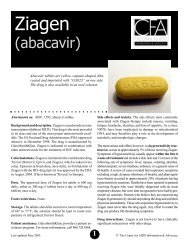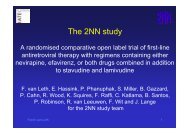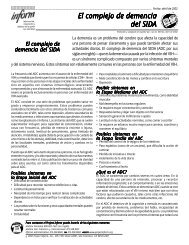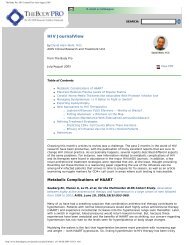Download PDF Version - Positively Aware
Download PDF Version - Positively Aware
Download PDF Version - Positively Aware
You also want an ePaper? Increase the reach of your titles
YUMPU automatically turns print PDFs into web optimized ePapers that Google loves.
tional Data Collection of Adverse Events<br />
of Anti-HIV Drugs) is a large, seven-year<br />
observational study from 11 cohorts from<br />
Europe, Australia, and the U.S. At CROI,<br />
a sub-study analysis from D:A:D was<br />
important enough that many activists felt<br />
it should have been in a late breaker presentation,<br />
rather than a less signifi cant poster<br />
discussion. It showed that people using<br />
Ziagen had a 90% increased risk of having<br />
a heart attack, although the overall number<br />
of heart attacks was very small. Th ere<br />
was also a 49% increased risk with use of<br />
Videx but not the other nucleosides studied,<br />
such as Retrovir and Zerit, which have<br />
been the usual suspects with increased lipid<br />
levels and insulin resistance—risk factors<br />
associated with heart attacks. Th e risk was<br />
only associated with people currently taking<br />
Ziagen and Videx, not with those who<br />
had a history of using these medications<br />
more than six months, suggesting that it<br />
is reversible upon stopping the drugs. One<br />
caveat with this study is that those subjects<br />
using Ziagen or Videx also had higher rate<br />
28<br />
15th Annual Retrovirus Conference (CROI), Boston, February 3–6, 2008<br />
of cardiovascular risks such as smoking,<br />
diabetes, or high blood pressure. Th is was<br />
also not a randomized controlled study, so<br />
results should be weighed with that in mind.<br />
However, the authors concluded that there<br />
was no inherent bias. Medical providers are<br />
waiting for more information. HIV specialist<br />
Joel Gallant, M.D., from Johns Hopkins<br />
University, told Th eBody.com, “If there’s a<br />
risk of a heart attack from the drug [abacavir],<br />
it’s small in comparison with the risk of<br />
smoking cigarettes or sitting on the couch<br />
eating potato chips. You have to be realistic<br />
and put this all in perspective.”<br />
SMART study<br />
On the other hand, the pros of staying<br />
on treatment are being proven in SMART<br />
sub-studies. Th e SMART study was a large<br />
randomized, controlled treatment interruption<br />
study closed in January 2006 because<br />
there were more complications and deaths<br />
in those discontinuing treatment than<br />
those randomized to stay on treatment. 85<br />
out of more than 5,000 people died in the<br />
SMART study, which is providing a wealth<br />
of data regarding the eff ectiveness of antiviral<br />
therapy and the harms of stopping treatment.<br />
At CROI there was information looking<br />
at what occurs when people restarted<br />
therapy aft er treatment interruption. Th ose<br />
PA • May / June 2008 • tpan.com • positivelyaware.com<br />
<strong>Positively</strong> <strong>Aware</strong><br />
Photo © Jeff Berry


